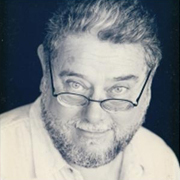
Phil Wallington
Australian-born Phil Wallington started out as a cadet journalist with ABC in Sydney in 1965, where bosses chastised him for wasting film by asking too many questions, and the cameramen included at least two future Oscar-winners (like The English Patient's John Seale). Then he headed off on his OE, working at the BBC in London as a scriptwriter and sub-editor.
Back in Australia he rejoined the ABC, then moved to Perth to present and cover current affairs on pioneering early evening news show This Day Tonight. Wallington’s ABC career involved work across Australia and in Papua New Guinea before independence. He moved from reporting into producing roles, becoming head of news and current affairs in Tasmania, manager of TV in Queensland, and federal head of The 7.30 Report.
In his keynote address to the 2015 SPADA conference, Wallington recalled taking particular pride in reporting stories from the outback "on the plight of Aboriginal people … They had — and still have — my profound sympathy.” But he faced resistance from his superiors. “I was asked why I did so many 'black-fella stories' and was advised by the wise men who ran TV news that such reports just didn’t rate.”
Wallington was behind the appointment of the first black woman to front an Australian current affairs show, when Tanzanian-raised Trisha Goddard began presenting The 7.30 Report. The ensuing controversy, and his waning confidence in ABC top management, led to Wallington jumping ship. After a short stint at the Nine Network, he was wooed over the ditch to executive produce a new show for TVNZ called Holmes.
A clash of concepts with presenter Paul Holmes meant the relationship lasted only seven weeks. Wallington shifted to Wellington to produce Frontline, TVNZ’s flagship weekly current affairs show.
Frontline made headlines in April 1990 with hour-long special ‘Pro Bono Publico – For the Public Good’. The controversial exploration of the relationship between business and the Rogernomics-era Labour Government alleged that election campaign donors had benefitted from state asset sales.
In the fallout, TVNZ was sued, faced a “winter hail storm” of defamation writs, staff were sacked (including the show’s executive producer and reporter) and the Frontline office was moved to Auckland. A special Broadcasting Standards Authority committee found the report to be in breach of standards of veracity, balance and fairness.
Wallington, who assumed an executive producer role after the crisis, believed the fallout was “a salutary lesson to be taken on board by all journalists…” He also believed the programme makers were abandoned by TVNZ (who settled claims), and that the furore signalled an erosion of the fourth estate’s ability to hold truth to power.
“I still believe that that the 'Pro Bono Publico' episode forever changed the face of news and current affairs broadcasting in New Zealand. It is a view which is shared by quite a few members of my profession.”
Other subjects he produced for Frontline included CORSO, policing juvenile offenders and a look back at the Wahine disaster. Wallington spent the next decade in executive producer roles on further high-profile current affairs shows, including 60 Minutes and Assignment. He also produced and directed reports for Sunday, including one on the first visit by a foreign head of state (Helen Clark) to post-Taliban Afghanistan in 2003.
After a battle with prostate cancer in the early 2000s Wallington took up a senior role at Wellington company Top Shelf Productions, where he has wrangled a diverse slate of documentaries and reality shows.
He produced all six episodes of 2007 TVNZ series New Zealand Exposed which looked at a range of environmental issues facing Aotearoa. The same year he shifted from the macro to the micro for consumer affairs programme Nailed, Sorted, Exposed.
His credits also include 90s-era TVNZ/Communicado crime series Under Investigation (where reporter Sean Plunket went incognito); script consulting on NZ history show Secret New Zealand; and making inserts for Māori Television’s Anzac Day broadcast with Tainui Stephens. Wallington was at the helm through multiple channel changes for media review programme Media Take (previously known as Media3 and Media7).
In 2004 Wallington wrote and directed an hour-long One News Insight documentary examining that year's floods in the lower North Island (Till the Cows Come Home). In 2009 he was creative producer on Saving Face, which looked at the pioneering work of Kiwi surgeons re-building the faces of WWI soldiers.
In 2014 he moved in front of the camera to present DIY Defence for Māori Television, a look at the wackier examples of Aotearoa’s World War II home front defences, including the Semple tank. Wallington continued to produce from his Horowhenua base, where he bred show dogs with his wife.
Wallington was a regular media commentator on RNZ National. He was an outspoken critic of the state of contemporary current affairs journalism, and bemoaned the demise of long-form investigation on-screen, which he called “now an almost extinct genre in New Zealand”.
Shows that Wallington executive produced won Qantas Media Awards (60 Minutes), an Australian UN Peace Prize (The 7.30 Report) and gongs at the New York International Festivals.
In 2015 he gave the John O’Shea keynote address to the annual SPADA conference. He went on to work on an eight-part series for Māori Television on the NZ Parliament.
Phil Wallington passed away on 11 September 2020.
Profile updated on 12 September 2020
Sources include
Phil Wallington
Phil Wallington, 'SPADA15: the John O'Shea address' Screenz website. Accessed 12 November 2015. Accessed 26 February 2016